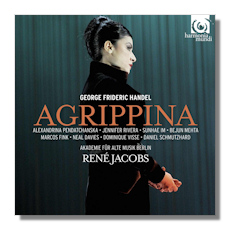
The Internet's Premier Classical Music Source
Related Links
- Handel Reviews
- Latest Reviews
- More Reviews
-
By Composer
-
Collections
DVD & Blu-ray
Books
Concert Reviews
Articles/Interviews
Software
Audio
Search Amazon
Recommended Links
Site News
 CD Review
CD Review
George Frideric Handel

Agrippina, HWV 6
Drama per music in tre atti
- Sunhae Im, soprano (Poppea)
- Alexandrina Pendatchanska, soprano (Agrippina)
- Jennifer Rivera, mezzo soprano (Nerone)
- Bejun Mehta, countertenor (Ottone)
- Dominique Visse, countertenor (Narciso)
- Marcos Fink, baritone (Claudio)
- Neal Davies, bass baritone (Pallante)
- Daniel Schmutzhard, baritone (Lesbo)
Academy for Ancient Music Berlin/Renè Jacobs
Harmonia Mundi HMC902088.90 3CDs
Also available with DVD documentary: ArkivMusic - JPC
In this important and sumptuous set of three CDs from Harmonia Mundi René Jacobs has "rebuilt" the original, Ur-version of Handel's first successful opera, Agrippina (1709). The studio recording from July of 2010 features eight soloists with the Academy for Ancient Music Berlin in their production by Vincent Boussard first staged at the Deutsche Staatsoper, Berlin in 2009. It has a presence and immediacy that only add to the excitement which original audiences in the early eighteenth century must have felt… there is a freshness, a vibrancy and an unsuppressible energy particularly in the ways in which (continuo) instruments work so closely in concert with the singers (listen to the interchange between Ottone, Claudio and Nerone in Act I, Scene 15 [CD.1 tr.17], for instance) that's impossible to ignore, and that makes this not only a serious contender, but the one to buy: it is the only recording to contain the music that Handel wrote for the third act, which is now almost always performed in a shorter, revised, version.
First performed in 1710 in Venice to a libretto by Vincenzo Grimani, Agrippina describes a series of amorous intrigues against the background of a corrupt and vicious first-century Rome. Character is important; the foibles, strengths and bents of the main characters in the opera are developed very quickly in this interpretation. This aspect of the production is essential to its success… Jacobs has refused to promote a series of two-dimensional stock characters. Instead, each personality is more rounded than perhaps we are used to in the genre.
In no small part this realism is also advanced by Handel's sensitivity towards contemporary trends in Venetian opera which effectively promoted a more natural pace of interchange between singers/actors. Fewer arias (particularly "exit" arias) were employed; the drama was tightened; the pace quickened.
It is in the third act (excisions from which actually remain visible in the autograph… merely crossed out in pencil) that this version of Jacobs (who has a clear conception of the metaphorical weight of Agrippina) is most different from others. Fuller and more authentic, it also makes the work more credible as a whole, although increases the number of recitatives at a point in the drama when we may be expecting the denouement to thrill, not explain. Generally, Jacobs has emphasized the allegorical function of the characters: Nero as Pleasure, Poppea as (corrupt) Beauty and so on. Hence the risk (completely avoided here) that roles and interactions could become more important, both musically and dramatically, than people and tensions. In this production they do not: personality, albeit with reference to personalities' drives and consequences, counts most highly.
The enunciation of the international cast (Pendatchanska is Bulgarian, Fink Argentinian, Sunhae Im Korean, for instance) is excellent… clear, communicative and full of expression. They each take the listener along with them, making us wish for the next turn of events as each aria, recitative and ensemble unfolds. It's these three singers, in fact, whom one would single out for special praise in their presence, projection and, particularly, their strong characterization of Agrippina, Claudio and Poppea respectively. Mention must also be made of Bejun Mehta's strong Ottone for sheer forcefulness and depth of interpretation.
But their roles are not over-acted. Nor dampened. Nor yet reduced to quaint mannerisms. The photographs that accompany the CDs suggest that the production used "adjusted" modern dress. Jacobs has hit the mark in this respect: there is a pleasing directness to the style which he sees through with great success from start to finish and that renders Handel's original intentions and dramatic concerns close, available, full of meaning.
The acoustic is giving, though not spacious, somehow managing to suggest a live recording, although it's a studio one. That's in fact quite apt and well reflects the ambience of the original performances. The "booklet" is 260 pages long, the bulk of those being the full libretto in Italian with translations into English, German and French, and contains helpful background and biographies of the principals, Akademie and Jacobs. No Handelian will want to miss this release; nor indeed anyone captivated by the handful of conductors hard at work today to bring us the glorious Baroque operas, it seems in quick succession, of which Jacobs is a leading example. For sheer delight, sparkle and exuberance, but never at the expense of depth, precision and thoughtfulness, this Agrippina is a winner.
Copyright © 2011, Mark Sealey.





















